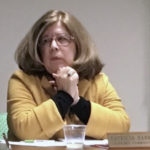Petitioners appeal for access to library properties, library director and attorney adamantly opposed
By Joey Gidseg
Corrected Saturday March 3, 2018 12:20pm re: branch library where Debbie Russell was petitioning


On February 17, IndyAustin volunteer Scott Royder received a “trespass notice” from the Austin Police Department, for refusing a library employee’s request to leave library property where he had been gathering signatures for a petition to bring CodeNEXT to a public vote.
The Austin Bulldog’s coverage of that incident triggered a discussion of the Library Use Rules at the February 26, 2018, meeting of the City’s Library Commission at the Pleasant Hill Branch. The discussion addressed whether citizens can distribute materials, including petitions for signatures, on Austin Public Library property.
Several people spoke during citizens communication, including IndyAustin volunteers who shared their experiences and concerns about being asked to leave multiple branch libraries where they were petitioning the same day as Royder.
Petitioners speak their minds

Debbie Russell had petitioned outside of the Hampton Branch at Oak Hill [not the Howson Branch as originally published] from 2:30pm to 4:15pm. She said that “an embarrassed and nervous staff member” had told her that she “wasn’t supposed to be there,” but that she had declined to leave.
Russell said she told the staffer she would take her chances with the police if they were called. None arrived during the additional hour Russell spent petitioning.
“I wasn’t harassing anybody. I wasn’t blocking the sidewalk. I was standing on the grass part of the area, about 100 feet from the entrance, and no one indicated they were annoyed with me.”
A long time activist and organizer, Russell said she believed that the library’s recent interference with power granted to the people under the City Charter to direct legislation by initiative was, in her opinion, “stepping on the First Amendment.” If the city imposed restrictions and barriers to keep petitioners off of public spaces and away from people, they would not be able to gather signatures. At that point, she said, “the city has virtually outlawed petitioning.”
Russell said in 2002 she organized a petition against the Patriot Act, “which was passed by the City Council” and recalled how at that time, the librarians were the first group to publicly back the resolution because “they did not want to infringe on peoples privacy or First Amendment rights.”
Austin Neighborhoods Council leader

Jeff Jack—president of the Austin Neighborhoods Council and a former member of both the Planning Commission and the citizens advisory group that worked on CodeNEXT—had also been asked to leave his neighborhood library, Twin Oaks Branch, where he had been gathering signatures.
“In many ways you are the depository of a human’s free speech,” Jack told the commissioners.
Curious to see what the library resources offered on freedom of expression, Jack said he searched the catalogue and found two books of widely different viewpoints: Democracy of Capitalism and The Communist Manifesto. Jack said it felt “incongruent” that the library willingly provided patrons access to books with different opinions, yet prohibited the practice of free speech at the library branches around town.
Jack strongly suggested that commissioners consider that the City’s policy with regard to the libraries should not be to “prevent civic responsibility to participate or strangle freedom of speech.”
Senator Barrientos

Gonzalo Barrientos, a former state representative and a retired state senator, told commissioners he was still “pushing for good government.” He said he wasn’t sure who had the authority to decide what the policy should be but “we’re talking about the U.S. Constitution—petitioning our government.”
As he understood it, Barrientos said, people were gathering signatures for a petition that they would bring to City Council, representing the people of Austin. “They were not blocking pedestrians. They were not inside. They were not hollering or banging on pots and drums.”
Barrientos said he hoped commissioners would “look at this as closely as possible and make some wise decisions.”
Attorney and petitioner

Bill Bunch, director of Save Our Springs Alliance and a petition volunteer, said he had also been asked to leave the Twin Oaks library, but had declined to do so because he believes that people have the constitutional right to petition on library sidewalks.
“Our First Amendment guarantees us the right and specifically says that the right shall not be abridged to petition for redress of grievances.”
Bunch, an attorney, added that the City Charter “specifically says that the power to petition—specifically for charter initiatives or ballot amendments—is reserved to the people.”
“Over the years the courts have recognized public sidewalks as a traditional space where you exercise your free speech rights and that’s what I was doing,” he said.
Bunch said he had seen a copy of the memo sent to library staff by the division manager and library commission liaison, Sharon Herfurth. He said a close reading of the library rule “doesn’t mention sidewalks as being off-limits for petitioning.” He said the rule “specifically talks about distributing literature or otherwise soliciting customers,” which Bunch insists he was not doing.
“If John Henry Faulk were alive today I can guarantee you he would be here tonight with us and with Senator Barrientos, standing shoulder to shoulder.”
Bunch suggested the library commission “pass some sort of resolution or give some direction to staff to please stand down and allow this (petitioning) to proceed.”
Commission and staff discussion
Commission Chair Chad Williams asked for an update from staff.

Roosevelt Weeks, who left his position with the Houston Public Library to become the Austin Public Libraries director last September, said library rules had been in effect since February 1, 2017, and were based on city rules effective since September 2015.
Weeks said the rules state that a library is not a public forum, and that the primary purpose for the library rules is to “prohibit customers from distributing literature or otherwise soliciting customers on library property.”
Catherine Hanna questioned Weeks about the definition and said it sounded as though the sidewalk was missing from the places described as being part of the library.
Staff attorney’s advice

Assistant City Attorney Lynn Carter provided more insight into what the problem had been with the IndyAustin petitioners, and why the “notice of trespass” was written. She said public sidewalks are within the public right of way and library staff had pointed out the public sidewalks to each petitioner and directed them to move there. But some petitioners had chosen to remain in the entrances of the libraries, and had refused to move from the library facility when asked.
“Courts say that sidewalks and parks are traditional public forums and the city’s policy complies with that,” Carter said.
The city can designate anything it wants as a non-public forum. This citizens communication is a limited public forum and you give people three minutes to speak on what they want to.
But a non-public forum does not discriminate on time, place, or manner and in this circumstance the city says, “Here’s our facility, which includes our entranceway and our passageway, parking areas.” But the sidewalks that are on the right of way are public sidewalks and that is a traditional forum. Otherwise its a non-public forum”
Referring to the City Charter, Carter said it doesn’t speak to types of forum, when it talks about petitioning, but the city is essentially saying, “We don’t want to disrupt customers. If you can catch them in the public right-of-way, that’s fair. That’s your petition in a public forum. But otherwise the libraries are not like the plaza at city hall.”
So who’s causing a problem?

Wendy Price Todd expressed surprise that the library believed that the presence of IndyAustin petitioners at library branches had somehow interfered with customers use or enjoyment of library facilities.
She said, “Twin Oaks has a sidewalk that wraps around part of it. On South Fifth (Street) most certainly there is a sidewalk that connects to the entryway. If you stood in front of Terrazas (Branch Library) at the front door you would be on the sidewalk, but once you moved to the parking lot you would suddenly be in a non-public forum.”
Perplexed by the inconsistency, Todd said, “From one branch to another there are many different scenarios of where one can stand and one can’t stand.”
As to how we all came to be discussing this issue in the first place, Todd added, “I don’t understand how this public-forum thing came to be and why we’re enacting it now. Is it targeted for this particular ballot issue?”
Weeks replied, “Let me just speak for libraries. We are an open environment where people can express their ideals. Where we get into a problem is if we have two opposing factions standing in our entryway.” If we say they can do that, then “we are on a very slippery slope.”
Libraries ‘not a public forum’
Weeks said when Sharon Herfurth had emailed the library rule to library staff members, the intent was to make things easier for them by giving them one policy that they can apply consistently to petitioners, regardless of location. He said that was important, “because if we let one individual do it then we have to let everybody do it. We don’t care what’s on the petition—that’s not our concern. Our concern is that you’re treating us as a public forum and we don’t want to be treated as a public forum on our property. That’s the bottom line.”
Agreeing with Todd, Williams said at some branches, like Howson—with its close proximity to the curb, and the street—the sidewalk would be easier for a petitioner to access people without violating library rules. But he found it “difficult to understand how we apply the same rule to every branch.”
Williams said he has seen library branches that are a full acre away from the street, and where a petitioners chances of connecting with any people to gather signatures would be limited.
Weeks then suggested that if he were a petitioner he would go to Howson. He did not address the fact that Russell said she was petitioning at Howson and was told to leave. [Deleted to note correction that Russell was at Hampton Branch, not Howson.]
He said for the library, the important thing is that they be consistent because if they start basing how the policy is applied “off of location and individuals, then we run into a whole lot of problems.”
Is petitioning ‘soliciting’?

Patricia Dabbert asked, “Do you consider petitioning soliciting?”
Attorney Carter said, “I think legally it would be, in terms of the definition, the definition under prohibited conduct includes soliciting money or donation or another thing of value from another person.”
Dabbert asked whether a signature was considered a thing of value, and Carter said it was.
Todd, following Dabbert’s line of reasoning, said there is a distinction between petitioning to get something on a ballot and engaging in a commercial enterprise.
Hanna said that Todd’s attempt at differentiation was beginning to appear like viewpoint discrimination.
Viewpoint discrimination is defined by The First Amendment Encyclopedia as “a form of content discrimination particularly disfavored by the courts,” and offers an example of what it would look like if the government practiced content discrimination as “restricting speech on a given subject matter” and when it engages in viewpoint discrimination. Specifically, it “singles out a particular opinion or perspective on that subject matter for treatment unlike that given to other viewpoints.”
Hanna said that Todd’s example once again emphasized why the library director and city felt the need to adopt a “one-size-fits-all” approach, to avoid being accused of favoring one branch of the library in a certain part of the city, while enforcing rules and restricting petitioning at a library branch across town.
Not selective enforcement
Weeks said one petitioner was given a “trespass notice” by a police officer, while IndyAustin volunteers at other branches were not due to the availability of officers at the time they were called, and did not represent an example of selective enforcement.
Todd requested that members of the library commission be briefed before being expected to discuss similar agenda items in the future. She said she tries to do her “homework and do the best I can do to represent the district and the library,” but that she had no idea that this was happening. She asked if any of the people who spoke during citizens communication would share their thoughts about their experience.
Hanna said that she would raise a point of order to that idea, adding that “this is a meeting in public, not a meeting of the public and they’ve had citizens communication, and I’m sorry, its not my place to say that, but we are on our way to a disruptive meeting.”
At that point, Bill Bunch asked if he could make a brief statement, and despite Hanna’s objection Williams allowed it.
Argues First Amendment rights
Bunch said the first rule Weeks had read to the Commission, the general city rule, had specifically identified “public sidewalks as public forums for where you exercise your First Amendment public speech rights.” He said if you read through the library policies and “argue that a public sidewalk on public library property is not a public sidewalk under the city policy, but instead falls under the library definition where you can be excluded.”
Bunch cited the definition of library facilities and said none of the petitioners had occupied them. He admitted he had stepped on the lawn, but that in the future he “would stay on the public sidewalk on public property.”
Williams said he felt “woefully inadequate to weigh in on this,” adding, that “probably like most of you, I see both sides. But it would appear that the city has a position.”
More fear of ‘slippery slope’
Weeks said he wanted the commissioners and those who spoke during public comments to understand that the rules were the City manager’s and that ultimately the decisions were up to him. He said the library was “opening and welcoming to anybody and everybody, period. “That’s our stance—period! We want to have civic engagement. When we have a program we are going to talk about issues. But when it comes to petitioning…protesting…we run a very slippery slope if we let it happen.”
Dabbert said she “was surprised that a signature was considered of value, and that a petition was considered a solicitation.” She suggested that perhaps the city could clarify its language for future patrons, to let them know that petitioning was considered solicitation, so that no one else receives a “notice of trespass” over a “misunderstanding or misinterpretation.”
Aimee Finney, who had been quiet until this point, used the example of a check. She said that if you write a check but don’t sign it, the check is invalid, making your signature something of value. To Finney, the points Weeks and the attorney made were very easy to understand: “the public sidewalks are there—on that side—the private sidewalks and areas are here, that’s all.”
Todd said that as a community we are invited to give blood and vote in libraries, that “we know where the signs can go up and where you can wear your T-shirt and hat and where you cannot.” She said she was sorry that “it sounded like perhaps in this case they (petitioners) crossed that line,” but that she was “disappointed that once you pull your car onto here (a library parking lot) its all of a sudden private property, city owned property.”
Todd requested that the Library Commission place this topic on a future agenda to give the commission a chance to decide how they feel as a board, and to give them time to think about it. A motion passed to post it to the March agenda for possible action.
The March meeting for the Library Commission will be held March 26 at the Ruiz Branch, 1600 Grove Blvd.
Links:
City of Austin Rules for Public Use of City Properties, effective Sept. 21, 2015 (6 pages)
Criminal Trespass Notice, February 17, 2018 (1 page)
IndyAustin SPAC Campaign Finance Report, January 18, 2018 (4 pages)
Library Use Rules effective February 1, 2017
Sharon Herfurth Email to Library Staff, February 16, 2018 (2 pages)
Related Bulldog coverage:
IndyAustin Petitioners Barred from Libraries: One IndyAustin petitioner issued a trespass notice to prohibit setting foot on Spicewood Library property, February 19, 2018
Trust indicators:
 Joey Gidseg is a volunteer researcher for The Austin Bulldog. This is Joey’s first article.
Joey Gidseg is a volunteer researcher for The Austin Bulldog. This is Joey’s first article.
Who funds this work? This report was made possible by contributions to The Austin Bulldog, which operates as a 501(c)(3) nonprofit for investigative reporting in the public interest. You can help support this independent coverage by making a tax-deductible contribution.
An alphabetic list of donors who have contributed to The Austin Bulldog since the organization was formed in 2009 and the cumulative amount each person has given through October 30, 2017, are listed on the Contribute page.
Comments are welcome: If you would like to post your reaction to this story, please do so on the Bulldog’s Facebook page.







